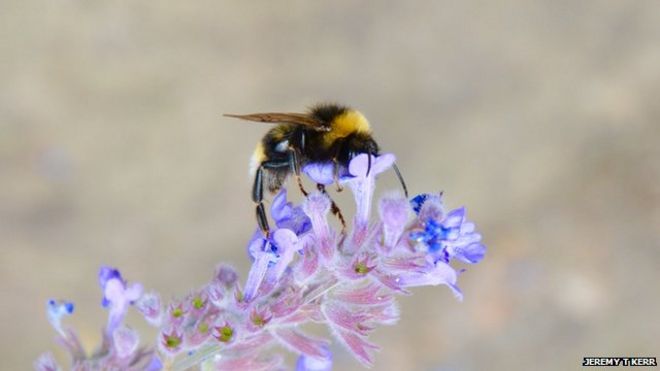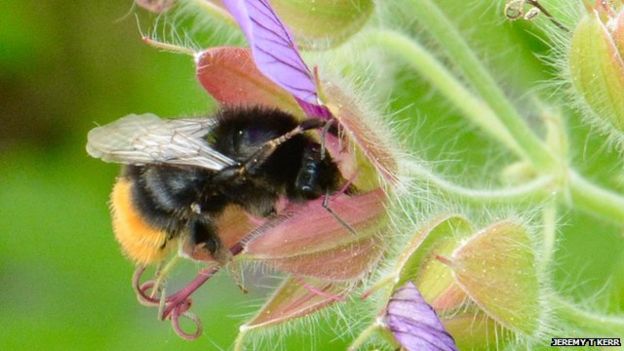At least quarterly we update our coverage on the plight of pollinators, including bees, trying to survive the shrinking habitat, mites, insecticides and general toxins that are threatening their very existence.
In the US bees are transported very long distances, from FL to CA, depending on the growing season in each region, and that further stresses their immune system and makes them vulnerable to colony collapse. The question is, will we kill them off completely? And, if we do, what happens to our food supply?
Climate 'vice' constricts bumblebees' natural ranges - researchers

Climate change is threatening the survival of bumblebees, significantly reducing the habitats in which they can survive, researchers say.
The analysis indicates that warming is having a greater impact than pesticides or land use change.
To ensure bees survive, humans may have to help move them to cooler areas, the European and American researchers add.
Century of data
Many creatures, including butterflies, have responded to a warming climate by moving towards the poles or towards higher ground.Bumblebees have dealt with the increasing heat by disappearing in large numbers from portions of their southern ranges, but the insects seem to have baulked at moving north. survive
They examined more than 420,000 historical and current records of bumblebee observations between 1901 and 2010 relating to 67 different species.
Taking the period between 1901 and 1974 as their baseline, the researchers found that in recent decades when temperatures have increased, the bees started to die off in the southern part of their ranges in both Europe and North America, at the same time.
"These species are at serious and immediate risk, for rapid human induced climate change," said lead author Prof Jeremy Kerr from the University of Ottawa.
'Impacts large'
"The impacts are large and they are under way - they are not just something to worry about at some vague future time."The researchers say the losses amount to a retreat of around 300km or around 9km a year from the bumblebees' traditional southern limits in Europe and North America.
"This is a surprise," said Dr Leif Richardson, one of the authors, from the University of Vermont.
"The bees are losing range on their southern margin and failing to pick up territory at the northern margin - so their habitat range is shrinking."

"This population growth rate limitation we suspect may be implicated as the key limitation on their capacity to track shifting climate conditions northward and into colder areas," said Prof Kerr.

- Bumblebees are seen as critically important for pollinating not just food crops but many wild plants and flowers as well.
- Pollination by insects is a key to the production of around one third of the food and drinks that humans consume.
- The larger bodies of bumblebees allow them to generate more heat so they can fly earlier and later in the day and in colder weather than most bee species, including honeybees.
- Many species have been in decline in recent years, with two - Cullem's bumblebee and the Short-haired bumblebee - going extinct in the UK this century.
In the US, spatially detailed annual pesticide measurements including neonicotinoids have been available since 1991. The researchers say that they have been unable to relate these data to the observed shifts in the bees' range.
"The result is widespread, rapid declines of pollinators across continents - effects that are not due to pesticide use or habitat loss," said Prof Kerr.
"It looks like it's just too hot."
Assisted migration
The authors say that bumblebees may need the help of humans to overcome the challenges of warming.Scientists believe that moving the insects to cooler climates, a process called assisted migration, might be necessary.
"If we are serious about preserving species like bumblebees for the future, it is possible we will need that to intervene in a significant and extensive way to help them adapt," said Prof Kerr.
But not everyone is convinced that human intervention is the best plan. Some researchers point to the fact that not every species of bumblebee has been affected in the same way by warming.
"There seem to be some interesting level of variation in bumblebee species' response to changes in climatic conditions, something that isn't discussed in the paper," said Dr Nathalie Pettorelli from the Zoological Society of London.
"This level of inter-specific variability might be important to consider when thinking about mitigation strategies, as one solution might not fit all."
The research has been published in the journal, Science.

No comments:
Post a Comment